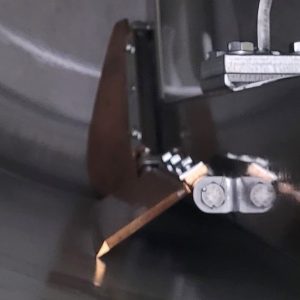 In common with Industry practice, we fit wall and floor scrapers to the agitation on our Grease Kettles. Scrapers peel the product off the vessel wall and floor to stop it caking up and forming a burnt layer.
In common with Industry practice, we fit wall and floor scrapers to the agitation on our Grease Kettles. Scrapers peel the product off the vessel wall and floor to stop it caking up and forming a burnt layer.
We normally make scrapers from bronze or PTFE due to the temperature range extending to 200°C.
- Bronze is durable. However, there is a concern that it could act as a chemical catalyst, affecting the soap or complex-forming reaction.
- PTFE is chemically inert in the temperature range, but can have a higher wear rate than Bronze.
Vessel manufacturers thought they had a solution to this dilemma by introducing PEEK. Originally, the nuclear industry used PEEK due to its ability to withstand neutron radiation. It is a “tough as old boots” high temperature plastic that is chemically inert and durable.
What could possibly go wrong?
Recently, we heard of an incident when mysterious particles turned up in a batch grease. The particles were almost chemically inert, would not readily melt and were physically tough and big enough to be a problem in smaller sized bearings.
Ultimately, the engineers traced the particles back to the PEEK scrapers. It turned out that although PEEK has a phenomenal temperature range, it doesn’t last forever, but instead becomes brittle, resulting in the leading edges crumbling and producing the particles.
This is not a problem for bronze, because bronze is relatively soft, so any microscopic filings from wear and tear would just get rolled flat inside any bearings that they might end up in. Furthermore, no-one found evidence that bronze was acting like a chemical catalyst. Scrapers can become stained but the grease remains unaffected.
It is not a problem for PTFE either, because PTFE is both soft and a natural lubricant, so microscopic particles are generally okay.
The bottom line is that there is no ideal solution. Unless asked for something different, we plant to continue using bronze scrapers on larger vessels and PTFE scrapers on smaller vessels.
